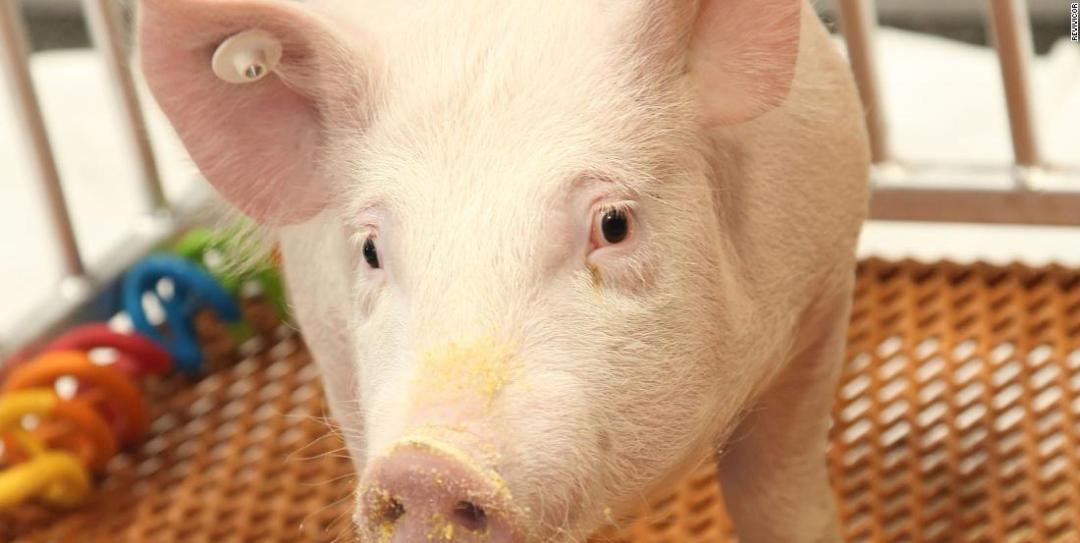Heard of genetically modified soybeans and corn, but do you know about genetically modified pigs?
Recently, the U.S. Food and Drug Administration (FDA) has approved the use of genetically engineered pigs for food and medical products, pigs developed by Revivicor Medical Company, which can be used in the future to produce drugs, provide transplanted organs and tissues, and produce safer meat for people with meat allergies.
Dr. Stephen M. Hahn, FDA Research Commissioner, said, "The first use of animal biotechnology products for food and biomedicine today is a huge milestone in scientific innovation and part of our public health mission, and the FDA strongly supports the development of innovative animal biotechnology products that are safe for animals, safe for humans and achieve their desired results. This progress underscores FDA's success in modernizing scientific processes and optimizing risk-based approaches that can drive cutting-edge innovation and reassure consumers. ”

Figure | genetically modified pigs raised in laboratories (Source: CNN)
The pigs have a scientific code name called "GalSafe Pigs", GalSafe pigs through intentional genomic alterations (IGA), designed to eliminate the α-gal sugar on the surface of pig cells, for people with Alpha-gal syndrome (AGS), may have mild to severe allergic reactions to the α-gal sugar in red meat (such as beef, pork and lamb), which as the name suggests GalSafe pigs do not have such problems.
It is understood that this is not the first time that the FDA has approved genetically modified animals. In 2009, the FDA approved genetically modified goats, and their goat milk produced a pharmaceutical component that prevents blood clots, and chickens that can produce drugs were approved in 2015. That same year, salmon became the first genetically modified animal to be approved for consumption, but the GalSafe pig marked the first time the FDA had approved the use of the genetically modified animal for both human consumption and medical use.
GalSafe pigs may be used as a source of medical products, such as the blood-thinning drug heparin, which does not contain detectable α-gal sugar; the tissues and organs of GalSafe pigs may also be used in patients undergoing xenotransplantation to address immune rejection, as α-gal sugar is considered a key cause of patient rejection.
Figure | experimental logic of transgenic pigs (Source: Revivicor)
As part of its review, the FDA assessed the safety of the IGA for animals and humans, analyzed the potential impact of approval on the U.S. environment by the approval of the GalSafe pig, and determined that it was no larger than a regular pig, that the GalSafe pig was raised in much stricter conditions than conventional farm pigs, and that no animal safety issues for GalSafe pigs were found, except for those expected in well-managed commercial pig operations.
The FDA also assessed the risk of IGA promoting the emergence or selection of antimicrobial bacteria that have an impact on human health that occur in or in GalSafe pigs. The FDA concluded that GalSafe pork food is safe for the general population, that the risk of microbiological food safety is low, and that this risk can be mitigated by the small number of GalSafe pigs entering the food supply, but there is no data in the data requested by the product developer to the FDA that can eliminate or prevent food allergies.
It is important to note that these pigs have not been evaluated for use as xenotransplantation products, and any such operation must be submitted to and approved by the FDA before these products can be used for human transplantation or implantation.
Figure | use of genetically modified pigs (Source: Revivicor)
In recent years, Revivicor Medical has been aggressive in its approach to genetically modified pigs, with researchers trying to breed GalSafe pigs with certain genetic similarities to humans, adding five human genes to the pigs' livers, kidneys, and hearts in the hope that organs could be harvested and used for transplantation in the future without the human body producing rejection, which sounds like science fiction, but somewhat works.
Figure | successful progress in heart xenotransplantation in pigs (Source: Nature)
Revivicor's transgenic pig heart has been transplanted into baboons, xeno transplanted hearts have maintained continuous life support function for up to 195 days, the paper has been published in Nature and attracted widespread attention, and humans share more than 90% of the DNA with baboons, and pig organ transplantation to primates is regarded as a key milestone.
It is understood that an average of 21 people die every day in the United States because they do not wait in time for the matching organs to be transplanted, revivicor believes that as long as scientists can make the human body accept these organs, genetically modified pig organs can fill this gap and create easily accessible and large supply of transplantable organs.
Human-to-human organ transplants have only been available since the 1950s, and scientists' consideration of organ transplants from animals to humans has begun to sprout. In the 1960s, Keith Reemtsma, a well-known American transplant surgeon, conducted an experiment on transplanting chimpanzee kidneys into humans, and a woman was able to extend her life by nine months.
The results of trying xenotransplantation procedures, such as the heart, are not promising. In 1984, during the most famous cross-species transplant, doctor Leonard Bailey successfully transplanted a baboon's heart into a baby, but died of heart failure 20 days later, which sparked a lot of controversy in society and was considered unethical.
Until now, cross-species transplantation has not been possible indefinitely because the human immune system is built to repel foreign bodies, and one of the challenges is to target the genes that the body rejects and then find ways to edit them. In addition to the body's rejection of organs, there are concerns about cross-species infections like swine flu because humans are not immune to many animal viruses across.
But scientists are still hopeful about the prospects of experiments in genetically modified pigs, although human organ transplants with pig hearts are still a long way off.